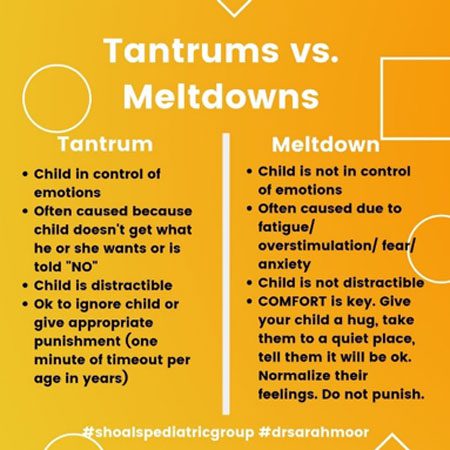
Now that the school year has started, I always make sure to ask my patients how things are going. I’ve found that parents sometimes have more anxiety than their children! Other times, a typical response I hear is, “I just don’t get it. My children are angels at school, but when they get home, they’re a mess! I want to hear about their day and all I get is a huge meltdown.”
As a mother myself, I know how hard it can be to have minimal time with your children and having that time monopolized by challenging behavior. You are not alone! These behaviors can result in a meltdown referred to as the “after-school restraint collapse.”
What is the After-School Restraint Collapse?
Andrea Loewen Nair, a counselor and parenting educator, coined the term “after-school restraint collapse” because kids often hold their feelings together all day at school and only feel safe to let it all out at home. Children and adolescents can release these emotions through:
- Screaming
- Crying
- Whining
- Disrespectful behavior
- Anger
While the after-school restraint collapse can affect all kids, it can be more prominent in sensitive children with learning or socialization problems. Further vulnerabilities, like a lack of sleep, hunger, overstimulation, or sickness, may result in even the most even-keeled child losing control at home.
Adjusting to a school schedule and everything it affects, like the time away from home, missing parents, having to sit still for hours, learning challenging topics, and navigating the social scene, takes time. When children get home, they are both emotionally and physically exhausted and are in an environment where they feel safe to let their emotions out. Keep in mind that these meltdowns differ from tantrums.
The graphic below outlines the differences.

Courtesy of Shoals Pediatric Group
What You Can do at Home
Something to keep in mind is that, while you have missed your child and are dying to know how their day was, they may be coming home completely overstimulated. If you bombard him/her/them with questions, this may lead to a meltdown.
Try to greet them with a smile and hug and avoid the impulse to ask them a million questions about their day. Creating a calm environment where your child can regroup and sit quietly may also be helpful. Your child needs a “brain break” when they get home and do not need to jump right into doing homework.
Limiting after-school activities can also allow your child to decompress. Remember that hunger is a huge vulnerability, so providing a snack and drink to rehydrate and replenish is key.
One last suggestion from Andrea Nair is to find small ways to stay connected with your child while they are at school. This can be through a matching bracelet you both wear, small notes in their lunchbox or folder, or giving them a picture of you together.
It may even help in the morning to give them extra snuggles, kisses, or participating in a special morning activity you do together like walking the dog or reading a short story. Some great books for children that discuss being away from loved ones are The Kissing Hand by Audrey Penn and The Invisible String by Patrice Karst.
When All Else Fails
No matter what you do, your child may still feel like a mess when they get home. If you are dealing with meltdowns, don’t resort to punishment. Allow your child to release their emotions while supporting and validating their feelings. It may be helpful to transition your child into a safe place where they can’t hurt themselves.
While a meltdown can be upsetting to watch and your child’s behavior may trigger you to react, don’t take it personally. Tell yourself that your child is having a hard time and that it has nothing to do with you. Take comfort in knowing that your child feels safe at home and this is a place where they can let their feelings out.
You may be tempted to talk about their meltdown and address their behavior while they are in the throes of one. We understand that urge but encourage you to wait for them to completely calm down. And don’t expect that talking about it will prevent a meltdown tomorrow. Remember, a meltdown is a release that is not controlled and not driven by the need for attention or to get something.
Finding Ways to Let Your Child Relax
Try to find positive ways for your child to decompress, such as:
- Going for a walk
- Taking a bike ride
- Swimming
- Playing music
- Dancing
Or, you can simply allow them to be in a room where they can relax on their own terms. It can be even better if you make this activity a part of their daily routine. Remember, routines are comfortable for everyone and can be calming to children since they will know what to expect at home.
When you calmly talk with your child, provide some suggestions on ways they can communicate their feelings. This can be done through art, using statements such as “I feel___ because___”, or even reminding them to take deep breaths.
When your child is calm, you may be able to identify triggers for these meltdowns and can brainstorm together ways to prevent or minimize them. Most importantly, express validation and empathy. Let them know that you love them and aren’t angry. While some kids are more sensitive and easily impacted by the restraint collapse, as the school year goes on and children get used to their new academic routines, these challenging moments will hopefully decrease.
Parent Clubhouse
We invite you to join our Parent Clubhouse meetings on the first Thursday of each month at 7:00 PM where we offer a chance to talk about parenting, mental health, what’s “normal,” and what can be cause for real concern when it comes to kids and mental health. Dr. Wendy Rice and several Rice Psychology Group team members will be present to answer your questions. There will also be group discussions on kids and mental health, as well as the chance to learn more about the child-related services we offer. These meetings are hosted at our South Tampa location at 312 S. Brevard Ave.


My son is an Autistic 17 year with ADHD. He is verbal and independent but has some meltdowns and behavioral issues